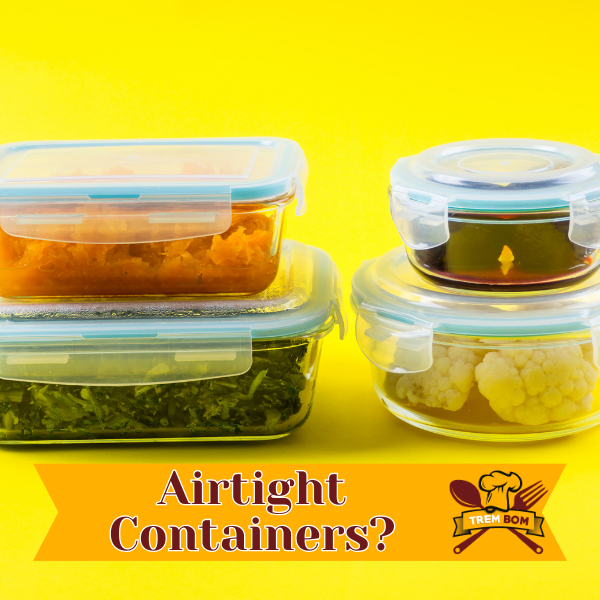
Welcome to our article on airtight containers and their impact on food freshness. At first glance, you might wonder if these containers truly make a difference in preserving the quality of your food. Well, wonder no more! We’re here to explore the role of airtight containers in food preservation and shed light on how they maintain the freshness of your favorite dishes.
Key Takeaways:
- Airtight containers play a crucial role in extending the shelf life of perishable items.
- They create a barrier against factors like bacteria, mold, and oxidation that spoil food.
- When choosing airtight containers, look for durability and a secure locking mechanism.
- Proper storage conditions, like temperature and humidity, also impact freshness preservation.
- Avoid common mistakes, such as overfilling containers or using damaged seals, to maximize freshness.
Understanding the Importance of Food Storage
Proper food storage is essential when it comes to preserving the freshness and quality of our food. It not only helps to prevent spoilage but also ensures that we can enjoy delicious meals for longer periods. By storing food properly, we can reduce waste, save money, and maintain a healthy lifestyle. In this section, we’ll explore the significance of food storage and the impact it has on our daily lives. So let’s dive in!
The Freshness Factor
When we talk about food storage, one of the key factors we need to consider is freshness. Properly stored food retains its taste, texture, and nutritional value for a longer time. Whether it’s fruits, vegetables, grains, or leftovers, storing them correctly helps to preserve their natural flavors and prevent the growth of harmful bacteria.
Proper food storage is key to keeping our meals fresh, ensuring that every bite is a delightful experience.
Longevity of Food
Have you ever bought groceries only for them to spoil before you have a chance to use them? It’s a common frustration many of us face. By storing food properly, we can extend its shelf life and reduce unnecessary waste. This not only saves us money but also allows us to make the most out of our food resources, contributing to a more sustainable lifestyle.
Optimal Nutrition
When food is stored in the right conditions, it retains its nutritional value for longer. This means that we can enjoy the health benefits that fresh produce offers even after days or weeks of storage. By ensuring proper food storage, we can maintain a balanced diet and provide our bodies with the essential nutrients they need.
Economic Impact
Wasting food not only impacts our personal budgets but also has a larger economic effect. According to the Food and Agriculture Organization of the United Nations, around one-third of all food produced for human consumption is lost or wasted globally each year. By practicing proper food storage techniques, we can reduce food waste, support our local economies, and work towards a more sustainable future.
| Benefits of Proper Food Storage |
|---|
| Preserves freshness and taste |
| Extends shelf life of food |
| Maintains nutritional value |
| Reduces food waste and saves money |
| Supports sustainable practices |
By understanding the importance of food storage, we can take the necessary steps to store our food properly and make the most out of our meals. In the next section, we’ll explore the role of airtight containers in food preservation and how they can help us maintain the freshness of our food items.
The Role of Airtight Containers in Food Preservation
Airtight containers are essential for preserving the freshness of your food. These containers are designed with a special seal that prevents air and moisture from entering or exiting, creating a protective environment for your perishable items.
By keeping air and moisture out, airtight containers play a crucial role in extending the shelf life of various foods, including fruits, vegetables, and leftovers. The moisture barrier prevents the growth of bacteria, mold, and other factors that can lead to spoilage, ensuring that your food stays fresh for longer periods.
| Airtight Containers | Food Preservation Benefits |
|---|---|
| Seal out air and moisture | Prevent bacteria growth |
| Extend shelf life | Minimize food waste |
| Preserve freshness | Maintain flavor and texture |
Whether you’re storing fresh produce, cooked meals, or pantry staples, airtight containers provide a reliable solution for keeping your food in optimal condition. With their ability to seal out air and moisture, these containers help maintain the quality, flavor, and nutritional value of your food, resulting in less food waste and more cost-effective meal planning.
Investing in high-quality airtight containers is a smart choice for anyone looking to preserve the freshness of their food and reduce waste. By keeping your perishable items airtight, you can enjoy the benefits of extended shelf life, minimize the risk of spoilage, and ensure that your meals taste just as delicious as the day you made them.
How Airtight Containers Maintain Freshness
Airtight containers are crucial for preserving the freshness of food. By creating a protective barrier between the food and the external environment, these containers shield the contents from factors that can cause spoilage and deterioration. The airtight seal prevents the entry of bacteria, mold, and oxidation, which are the primary culprits behind food spoilage.
By keeping these harmful elements at bay, airtight containers ensure that your stored food maintains its quality, flavor, and nutritional value for a longer period. The freshness preservation benefits offered by airtight containers are particularly valuable for perishable items such as fruits, vegetables, meats, and leftovers.
When food is exposed to air, moisture, and bacteria, it undergoes chemical changes that lead to spoilage. Oxidation, for example, can cause color changes, rancidity, and loss of nutrients. Bacteria and mold thrive in moist and oxygen-rich environments, leading to the growth of harmful microorganisms that can make the food unsafe to consume.
“By creating an airtight seal, these containers effectively lock out air and moisture, safeguarding the freshness and quality of the stored food.”
An airtight container acts as a physical barrier that prevents these spoilage-inducing factors from coming into contact with the food. It maintains the ideal storage conditions by creating an environment that is free from oxygen and excess moisture. With no exposure to air, the food inside the container remains protected, preserving its freshness and integrity.
The airtight seal also helps to retain the natural flavors and aromas of the food, ensuring that it tastes as fresh as possible when it is eventually consumed. Whether it’s leftover pizza, sliced fruits, or cooked meals prepared in advance, airtight containers offer a reliable solution for keeping the food at its best.
| Benefit | Description |
|---|---|
| Prevents bacterial growth | The airtight seal prevents the entry of bacteria, reducing the chances of foodborne illnesses. |
| Minimizes oxidation | Airtight containers protect food from exposure to oxygen, which helps slow down the oxidation process. |
| Maintains moisture balance | By preventing moisture loss, airtight containers help retain the ideal level of moisture in the food, preventing it from drying out. |
| Preserves flavor and freshness | With no exposure to external factors, airtight containers maintain the original taste, aroma, and texture of the food. |
When using airtight containers for freshness preservation, it’s important to choose high-quality containers that provide a secure seal. Transparent containers can also be beneficial, allowing you to easily identify stored items without the need to open them.
Remember, while airtight containers are essential for maintaining freshness, it’s equally important to consider other factors such as proper storage conditions, temperature, and humidity. By following best practices for food storage and utilizing airtight containers, you can extend the shelf life of your food and reduce waste.
Choosing the Best Airtight Containers
When it comes to selecting airtight containers for food storage, we must consider a few crucial factors. The right choice can make all the difference in preserving the freshness of our meals. Let’s explore what to look for when choosing the best airtight storage containers.
Secure Locking Mechanism
One of the key features to consider is a secure locking mechanism. A tight seal ensures that no air or moisture can enter or escape, creating an optimal environment for freshness preservation. Look for containers with reliable locking mechanisms that are easy to open and close securely.
Durable and Food-Safe Materials
It’s important to choose containers made of durable, food-safe materials. Opt for containers that are BPA-free and food-grade certified. These materials not only guarantee the safety of your food but also provide added durability and longevity to the containers themselves.
Pro tip: Transparent containers can be a game-changer. They allow you to easily identify the contents without opening them, minimizing unnecessary exposure and maximizing freshness.
Size and Versatility
Consider your storage needs and choose containers that are the right size for your purposes. Containers with varying capacities can be useful for different types of food items. Additionally, opt for containers that are stackable, as they maximize storage space and keep your kitchen organized.
Ease of Cleaning and Maintenance
Keeping your airtight containers clean is essential for maintaining freshness and preventing contamination. Look for containers that are dishwasher-safe, or easy to hand wash with minimal effort. Containers with removable silicone gaskets and lids make cleaning a breeze.
| Feature | Benefits |
|---|---|
| Secure locking mechanism | Prevents air and moisture from entering or escaping, ensuring freshness |
| Durable and food-safe materials | Ensures safety, durability, and longevity of containers |
| Transparent design | Allows easy identification of contents, reducing unnecessary exposure |
| Size and versatility | Offers flexibility to accommodate various food storage needs |
| Ease of cleaning and maintenance | Simplifies maintenance to keep containers clean and fresh |
By considering these factors, you can confidently select the best airtight storage containers for your needs. Remember, investing in high-quality containers will pay off in the long run, helping you preserve the freshness of your food and reduce food waste.
Other Factors to Consider for Freshness Preservation
While airtight containers are effective in preserving freshness, proper food storage encompasses more than just the container itself. Factors like temperature, humidity, and light exposure also play a significant role in maintaining the freshness of your food. To optimize freshness preservation, here are some additional considerations:
- Temperature: Store your airtight containers in cool areas, as heat can accelerate spoilage. Avoid placing them near heat sources such as stoves or ovens.
- Humidity: Moisture can promote bacterial growth, causing food to spoil faster. Ensure that the storage area is dry to minimize moisture build-up.
- Light exposure: Light can degrade the quality of certain foods, leading to flavor loss and nutrient deterioration. Keep your airtight containers away from direct sunlight or bright artificial light.
By considering these factors alongside using airtight containers, you can enhance the freshness preservation of your stored food and extend its shelf life.
Tips for Maximizing Freshness Using Airtight Containers
When it comes to keeping your food fresh, airtight containers play a crucial role. However, there are a few additional techniques you can employ to maximize the freshness of your stored food.
Clean and Dry Containers
Before using your airtight containers, it’s important to properly clean and dry them to prevent any contamination. Residual moisture or food particles can compromise the freshness of your stored items.
Divide Large Quantities
If you have large quantities of food to store, consider dividing them into smaller portions. This practice minimizes exposure to air when opening the container. By only opening what you need, you can maintain the freshness of the remaining food.
Label and Date
Labeling and dating your airtight containers is a simple technique that can make a significant difference in freshness. By identifying the contents and the date of storage, you can easily track which foods need to be consumed first, ensuring you use the oldest ones before they spoil.
Implementing these tips alongside using airtight containers will help you maximize the freshness and longevity of your stored food, allowing you to enjoy delicious meals for longer.
| Technique | Benefits |
|---|---|
| Clean and Dry Containers | – Prevents contamination |
| Divide Large Quantities | – Minimizes exposure to air |
| Label and Date | – Easily track freshness |
Common Mistakes to Avoid
When it comes to food storage, proper technique is key to ensuring the freshness and longevity of your perishable items. While airtight containers play a crucial role in keeping your food fresh, there are a few common mistakes that can undermine their effectiveness.
- Avoid overfilling containers: While it may be tempting to cram as much food as possible into a container, overfilling can limit the efficiency of the airtight seal. This can allow air and moisture to enter, compromising the freshness of your food. To maximize the effectiveness of airtight containers, be sure to leave enough space for the seal to create a tight barrier.
- Avoid using damaged or worn-out containers: Containers with damaged or worn-out seals may not provide the necessary airtight environment required to preserve freshness. Before using a container, inspect the seal for any signs of cracks, tears, or deterioration. If the seal is compromised, it’s best to replace the container to ensure optimal storage conditions.
By avoiding these common mistakes, you can enhance the performance of your airtight containers and ensure that your food stays fresh for longer periods.
Exploring Alternatives to Airtight Containers
Airtight containers are undoubtedly effective for food storage, but there are instances where alternative options may better suit specific needs. By understanding the unique requirements of different foods, you can make informed choices to ensure optimal freshness preservation. Here are some alternative methods to consider:
Vacuum-Sealed Bags
Vacuum-sealed bags are a popular choice for long-term storage of perishable items. By removing air from the bag, these specialized bags create an airtight environment, preventing spoilage and freezer burn. Vacuum-sealed bags are highly versatile and can be ideal for storing items such as meat, fish, and bulk produce.
Canning Jars
Canning jars have been a trusted food storage method for centuries. These jars feature an airtight seal created by a metal lid and a screw-on band. They are particularly suitable for preserving homemade jams, pickles, and sauces. Canning jars are a great option for those who enjoy DIY food preservation.
Specialized Containers
Some foods require specific storage conditions, and specialized containers cater to these unique needs. For example, bread boxes with ventilation panels help maintain the crustiness of bread while keeping it fresh. Cheese storage containers with built-in cheese paper or cheese boards help regulate humidity levels and prolong the life of cheese. By investing in these purpose-built containers, you can preserve the quality of specialized food items.
In summary, airtight containers are versatile and effective for most food storage needs. However, exploring alternative methods like vacuum-sealed bags, canning jars, and specialized containers can provide tailored solutions for specific items. By considering the unique requirements of different foods, you can make the most appropriate choices to extend the freshness and longevity of your stored food.
Conclusion
In conclusion, airtight containers offer a fantastic solution for keeping your food fresh. With their ability to create a protective seal that blocks out air and moisture, these containers play a crucial role in extending the shelf life of perishable items. By investing in high-quality airtight containers, you can ensure that your food remains fresh for longer periods.
However, it’s important to remember that proper food storage goes beyond just using airtight containers. Factors such as storage conditions, temperature, and humidity also contribute to freshness preservation. By considering these factors and avoiding common mistakes like overfilling containers or using damaged seals, you can maximize the effectiveness of airtight containers.
So, whether you’re storing fruits, vegetables, or leftovers, be sure to choose the right airtight containers and practice optimal food storage techniques. With the combination of airtight containers and proper storage methods, you can enjoy fresh and delicious meals for an extended time, reducing food waste and enhancing your culinary experience.
FAQ
Do airtight containers keep food fresh?
Yes, airtight containers play a crucial role in preserving the freshness of food. They create a seal that prevents air and moisture from entering or exiting, which helps extend the shelf life of perishable items.
Why is proper food storage important?
Proper food storage is essential for maintaining the freshness and longevity of food. It helps prevent spoilage, bacterial growth, and oxidation, ensuring that the food stays safe to consume and retains its quality.
How do airtight containers maintain freshness?
Airtight containers create a barrier between the food and the external environment. This barrier prevents exposure to factors like bacteria, mold, and oxidation, which can lead to spoilage. By keeping these elements at bay, airtight containers help maintain the freshness and quality of the stored food.
What should I consider when choosing airtight containers?
When selecting airtight containers, look for those with a secure locking mechanism and made of durable, food-safe materials. Transparent containers can also be advantageous as they allow easy identification of the contents without opening them.
Are airtight containers the only factor in freshness preservation?
While airtight containers are effective, other factors like temperature, humidity, and light exposure also play a significant role in freshness preservation. Store your airtight containers in cool, dry, and dark areas for optimal freshness.
How can I maximize freshness using airtight containers?
Alongside using airtight containers, clean and dry them thoroughly before use to prevent contamination. Divide large quantities of food into smaller portions to minimize air exposure when opening the container. Label and date your containers to ensure the oldest food gets used first.
What mistakes should I avoid when using airtight containers?
Avoid overfilling containers as this can limit the efficiency of the airtight seal. Additionally, refrain from using containers with damaged or worn-out seals, as they may not provide the necessary airtight environment for freshness preservation.
Are there alternatives to airtight containers for food storage?
Yes, depending on the specific needs of certain items, alternatives like vacuum-sealed bags, canning jars, or specialized containers may be more suitable. Understanding the unique requirements of different foods can help you make informed choices.






